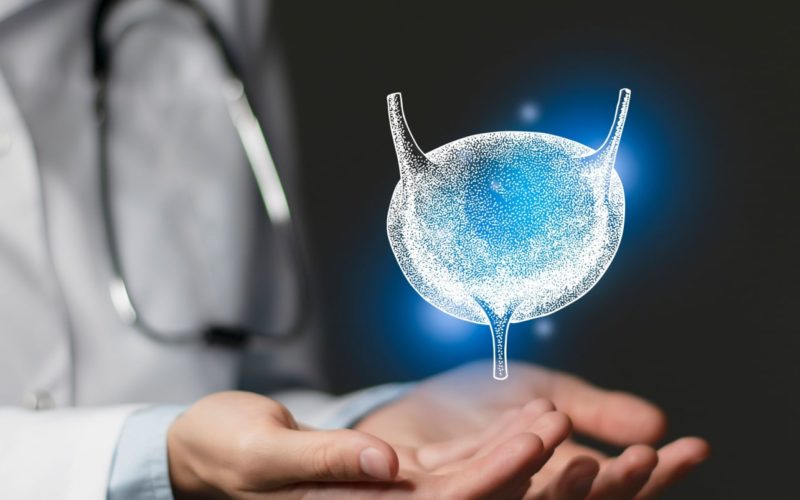The human urinary bladder is a hollow, muscular organ, situated in the lower part of the abdomen. Its function is to store the urine till it is emptied out of the bladder. The inner lining of the bladder is lined with urothelial cells. Bladder cancer is said to occur when these healthy cells lining the bladder change and grow out of control, forming a tumor. Usually, bladder cancers are treatable if diagnosed at an early stage. However, it tends to recur. Thus, it is important for people with bladder cancer to have regular follow-up visits even after treatment.
Bladder cancer symptoms

- Blood in urine or hematuria
- Frequent urination
- Painful urination
- Back pain
- Waking up at night to urinate or nocturia
- Feeling of incomplete emptying of the bladder
Bladder cancer causes
Bladder cancer is caused when cells in the bladder lining undergo mutation in their DNA. These changes cause rapid and uncontrolled multiplication of cells, forming a tumor. The tumor invades and destroys normal body tissues and later on, spreads (metastasize) to other parts of the body as well. There are several factors that can lead to bladder cancer which includes the following:- Smoking: Smoking cigarettes, cigar, or pipes can cause the build-up of harmful chemicals that can accumulate in the urine. These harmful chemicals can cause damage to the bladder lining, increasing your chances of urinary bladder cancer.
- Age: Increasing age can make you susceptible to bladder cancer, especially if you are above the age of 55 years.
- Gender: Males are believed to be affected by bladder cancer more than females.
- Chemical exposure: The kidneys are responsible for filtering harmful chemicals from your bloodstream into the bladder. For this reason, being around certain chemicals can increase the risk of developing bladder cancer. Some of these chemicals are arsenic and those used in the manufacture of rubber, leather, dyes, paint, and textiles.
- Previous history of cancer treatment: Radiation treatments aimed at treating the pelvic region for a previous cancer, increases the risk of developing bladder cancer.
- Chronic bladder inflammation: Repeated urinary infections or inflammations (cystitis), caused by long-term usage of catheter, can increase the risk of squamous cell bladder cancer.
- Personal or family history of cancer: Although it is rare for bladder cancer to run in families, if your blood relative such as parent, sibling, or child has suffered from bladder cancer, it makes you more prone to get cancer. If you have had bladder cancer earlier, it may still recur despite treatment.
Bladder cancer staging
For treating bladder cancer, it is divided into various stages based on the following criteria:- Location and size of the tumor
- Presence of cancer cells in the lymph nodes
- Presence of cancer cells in other areas of the body
Urinary bladder treatment
As stated above, bladder cancer treatment depends on the stage and grade of the cancer as well as the type of cancer involved. There are different approaches for treating bladder cancer. Some of the important ones have been briefly described below:- Surgery: This involves surgical removal of the cancer cells.
- Chemotherapy: It involves two approaches–intravesical chemotherapy (putting chemotherapy drugs inside the bladder directly) and systemic chemotherapy (giving chemotherapy injections). Intravesical chemotherapy is limited to treating the lining of the urinary bladder and carries a high risk of recurrence. On the other hand, systemic chemotherapy is the primary means of treatment when surgery is not an option.
- Radiation therapy: Cancer cells are destroyed through radiation when surgery is not desired or can’t be resorted to.
- Immunotherapy: This aims to trigger the body’s immune response to fight against cancer cells, located either in the bladder or throughout the body.
- Targeted therapy: This is suitable to treat advanced stages of bladder cancer, when all other treatment options have proved futile.
At NU Hospitals, located in Bangalore (India), you can expect the best urology treatment, especially if you are suffering from urinary bladder cancer. Armed with the latest medical equipment and facilities, this hospital takes care of all your urology-related problems. With its highly qualified team of medical professionals, NU Hospitals boasts of providing the solutions to all your health needs. Visit this hospital today and get yourself treated without delay!
References:
- Bladder cancer. Mayo Clinic. https://www.mayoclinic.org/diseases-conditions/bladder-cancer/symptoms-causes/syc-20356104.
- Bladder cancer basics. Urology Care Foundation. https://www.urologyhealth.org/healthy-living/care-blog/2022/bladder-cancer-basics.
- Bladder cancer: Introduction. Cancer.Net. https://www.cancer.net/cancer-types/bladder-cancer/introduction#:~:text=Bladder%20cancer%20begins%20when%20healthy,pelvis%20and%20ureters%20and%20urethra.
- Bladder cancer: The Basics. https://www.oncolink.org/cancers/urinary-tract/bladder-cancer/bladder-cancer-the-basics.

